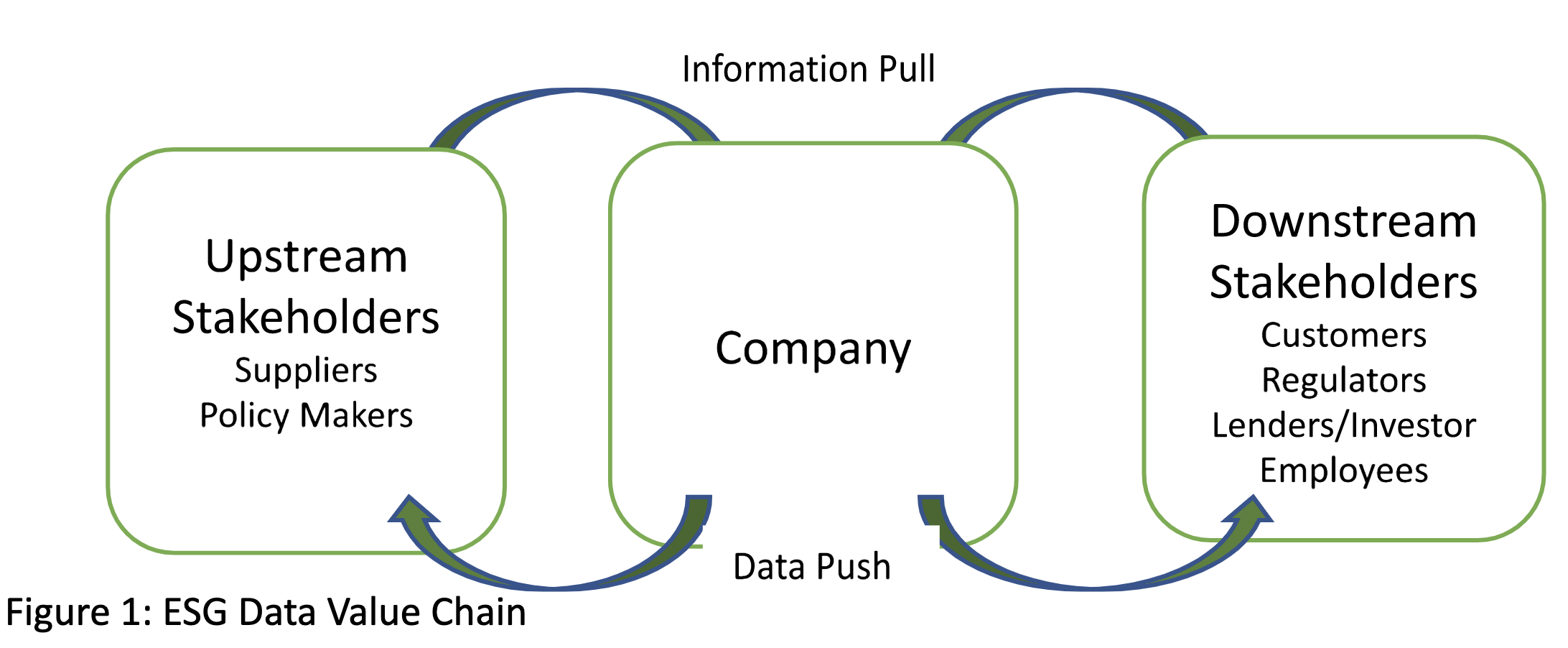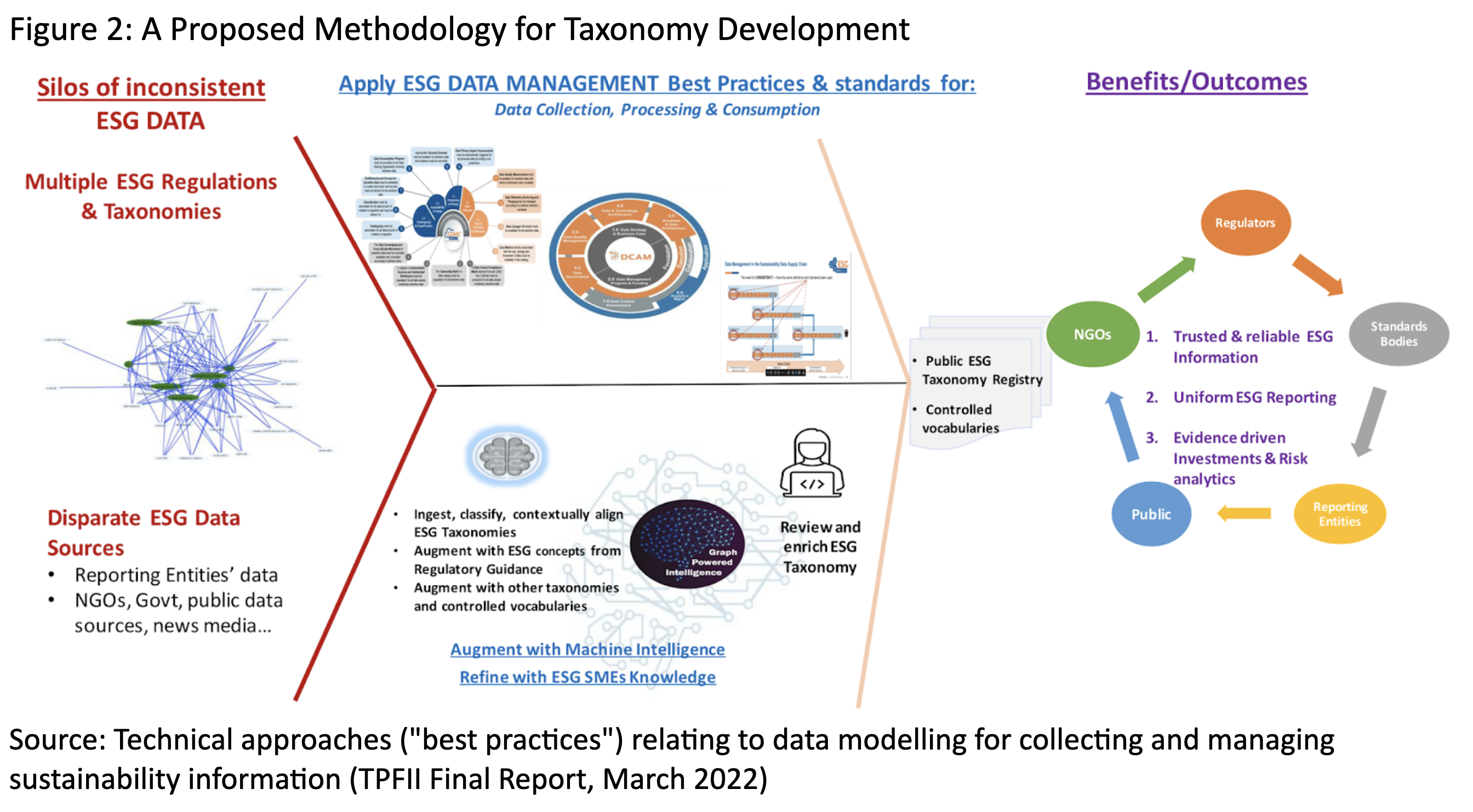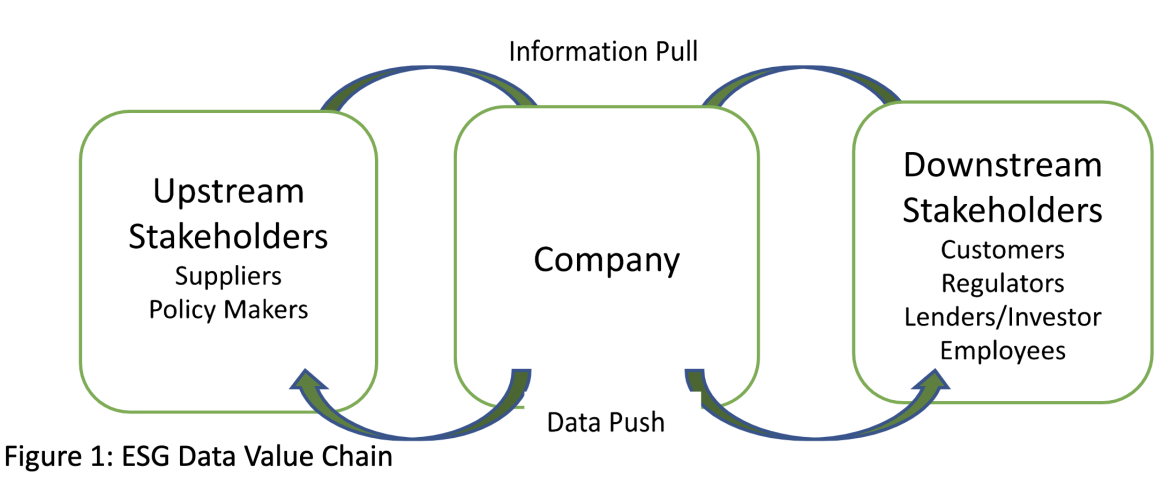An Innovative Way Forward for ESG
Co-Authors: John Bottega, President, EDM Council and David Wray, President, DFCG International Group
As W. Edwards Deming once famously said: “In God We Trust, All Others Must Bring Data.” Never have these words been more relevant and truer than now!
Climate scientists seek specific quality data for their models and projections for land and space climate analysis. Policymakers require data to measure the economic impact of climate change and establish policies to manage it. Banks use climate data to inform portfolio investment and lending decisions, and performance monitoring. Companies need data to manage their value chain impacts and climate risks. Finally, customers depend on climate data to inform their purchasing decisions. Each actor uses climate data to inform decision-making and hold others to account.
Data is, of course, created within an ecosystem of actors, not in siloed isolation. It becomes important for each stakeholder within the information chain to understand how the external environment interacts with their business, and then transmit that information along a value chain to the next participant in it (see figure 1).

Figure 1: ESG Data Value Chain
Why is this context important? It simply helps us understand more clearly the ESG ecosystem problem. There are four fundamental data related issues within the ecosystem:
- A lack of clarity: Actors in the value chain don’t know what information is needed by others, or even themselves at times, which explains…
- A lack of data management robustness: Companies, in particular, have not invested in ESG data governance the way they have in financial data governance leading to immature risk and opportunity management practices, made more complex by…
- A lack of accessible and discoverable data: Information is trapped in siloed systems, is often in a non-digital format, or is in a multitude of data formats, using inconsistent vocabulary and differing forms, which results in…
- A lack of actionable data: The lack of high quality and decision-useful data is unsurprisingly resulting in sub-optimal decision making. This adversely impacts the planet, societies, and companies everywhere.
The fundamental issue that has led to this point is the lack of international collaboration to establish an interoperable infrastructure which, at its most basic level, is the ability to compare, share, and use information across the supporting digital data ecosystem. For instance, in the context of the greenhouse gases (GHG), interoperability means the extent to which results generated by different implementations of GHG accounting systems can be compared and/or leveraged. There is a proliferation of corporate GHG reports that are using different interpretations and input data, even when following similar standards and protocols. Interoperability does not require uniformity but rather requires design for the comparison and translation of digital information among different systems.
Unfortunately, differing market needs and regulatory priorities are inadvertently accelerating development of siloed digital taxonomies and data management frameworks around the world. This increases the risk of a lack of global interoperability, a lack of data lineage and misaligned data definitions and taxonomy structures.
Additionally, the resulting alphabet soup of digital taxonomies and initiatives are not easily embedded into software for multi-taxonomy reporting. In this, micros, small, medium enterprises (MSMEs) are disproportionately impacted as they often lack the resources needed to bridge the data gaps. A material issue when you consider that according to the World Bank they represent about 90% of businesses and more than 50% of employment worldwide. They are embedded in global supply chains, local economies, and communities – solving the digital divide is critical to ensure that no one is left behind!
Therefore, the DSD-Lab’s (Digitization of Sustainability Data (DSD) Lab) three-year project was announced earlier in 2022.
What is the DSD-Lab?
It is a convening space, a hub, where stakeholders come together to collaborate on establishing best practices for interoperability of all taxonomies (financial, ESG or others), definitions, and data dictionaries amongst others. The lab approach is founded on using consistent semantics, which comprise uniform and unambiguous definitions for the data and models involved, and the relationships between them.
Why is the DSD-Lab different?
In a nutshell, the approach is about integrating initiatives throughout the world into a cohesive fabric using a consensus-based approach to bring actors and stakeholders together to solve these issues. The DSD-Lab is not about creating new standards, collecting data, or developing frameworks – it is about integrating what the market needs and connecting it through a shared technical infrastructure (i.e., we ensure interoperability at the technical level, not the policy level).
To illustrate, the DSD-Lab leverages global leaders such as XBRL International to develop best practices in taxonomy development with all the major accounting and sustainability standard setters around the world, and with EDM Council to leverage its industry leading Data Management Capability Assessment Model (DCAM) model for data management best practices and its Open Knowledge Graph Lab for collaborative data model ontology development.
Earlier in 2022, the team collaborated on an initiative to highlight the importance of thinking about information flows from both data management and value chain perspectives. The Use Case aim was to show how a shared smart dictionary that links the concepts, terms, works, metrics, etc. of sustainability standards, regulations, and frameworks could help mitigate taxonomy user risks associated with both divergent standards and divergent taxonomies. One of the assets developed from this initiative was a proposed methodology for taxonomy development (figure 2) – it is the iterative nature of the activities, data insights and the feedback loops that produce high quality data outcomes.

Figure 2: A Proposed Methodology for Taxonomy Development
Source: Technical approaches (“best practices”) relating to data modelling for collecting and managing sustainability information (TPFII Final Report, March 2022)
Who founded the DSD-Lab?
The DSD-Lab was founded by XBRL International, EDM Council, IceBreaker One, OS-Climate and Liv Watson, Senior Digitization Advisor at Capitals Coalition and David Wray, President of DFCG International Group. The larger collaborative group includes several of the Big 4 Accounting firms, International Accounting Association bodies, Software developers, NGOs, Intergovernmental organizations, Regulators, Sustainability experts, Technical standard setters, Preparers, and Investor groups amongst others.
Remain informed about the digitization of sustainability information flow work by signing up here. Join us on this exciting journey and get involved, however it makes the most sense for you!
About EDM Council
EDM Council is the global association created to elevate the practice of data management and analytics as a business and operational priority. The Council is the leading global advocate for the development and implementation of data standards, best practices, and comprehensive training and certification programs. With more than 300 member organizations globally from the Americas, EMEA, and Asia, and more than 20,000 data management professionals as members, EDM Council provides a venue for data professionals to interact, communicate, and collaborate on the challenges and advances in data management and analytics as critical organizational functions. For more, explore www.edmcouncil.org
About DFCG International Group
DFCG is the leading French CFO network association with the essential mission: professional and personal improvement and development by offering a space for exchange and sharing of good practices both nationally and internationally. The association partners with peer CFO associations throughout Europe, the Africa region and Latin America to bring finance leaders, representing thousands of companies (from SMEs to multinationals), together to learn and build best-practices. DFCG is a founding member of the International CFO Alliance, consisting of over 20,000 members across its network, and chairs the International ESG Working Group and the Digitization, Automation and Finance Transformation Working Group. For more, explore www.dfcg.fr .


